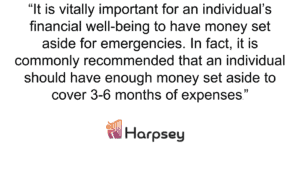It is important to have an emergency fund because unexpected expenses are a fact of life. No matter how carefully we plan and budget, we will always encounter a situation where we are hit with an unexpected monetary expense such as a medical bill or auto repair bill. It is at these moments where an emergency fund is advantageous, even necessary.
In a recent survey by CNBC, it was revealed that over half (53%) of Americans don’t have an emergency savings fund. In fact, the results of the survey showed that only 45% of Americans do have money put aside for an emergency financial expense.
Why Do So Many Americans Lack Emergency Funds?
In an era of global financial uncertainty, it is understandable that many people do not find themselves in a position to create a fund for emergency situations (such as sudden loss of income, or medical expenses). However it is vitally important for an individual’s financial wellbeing to have money set aside for emergencies or they will resort using emergency same day loans which may be costly. In fact, it is commonly recommended that an individual should have enough money set aside to cover 3-6 months of expenses.
It may seem like this is an intimidating amount of cash to have on hand, particularly for those who currently have no emergency savings built up. However there are several ways to begin building up an emergency fund that are easier than you may think.
What Is An Emergency Fund?
An emergency fund is money that you set aside in case of sudden financial expenses. The money that is reserved can be used to help to cover costs in case of an emergency, thus preventing you from having to acquire money by other means such as a payday loan (and thus preventing you from potentially going into debt).
It is a form of protection to help you get back on your feet more quickly during a moment of crisis. It is also a form of saving that can help you achieve financial freedom in the long term. While there are other forms of protection, such as taking out insurance, it is still important to have an emergency fund as an extra precautionary measure.
How Much Should I Save in an Emergency Fund?
The general recommendation for an emergency fund is around 3 months of your salary. However, it is important that you do some budgeting work to find out what the correct amount to save is for you.
Figure out your living expenses and calculate how much you spend per month on your mortgage, rent, car expenses, food or anything else of particular importance. Your goal is then to have 3x that amount saved in case of an emergency.
It is important to do this budgeting exercise anyway. Often when compiling your monthly budget, you can spot ways in which you can cut back and save on food, household bills, fuel and more.
What Can I Use An Emergency Fund For?
It is important that you only use the emergency fund in case of an actual financial emergency. It is not for regular spending. There are many examples of potential unforeseen costs. These include:
- Auto repairs
- Medical bills
- House repairs
- Veterinary bills
- Funeral costs
- Job loss
- Salary decrease
- Dental bills
How Can I Set Up An Emergency Fund?
Taking advice from ConsumerFinance.gov, there are a few things to keep in mind when setting up an emergency fund. The first is deciding where you are going to set up the fund. You will need to decide which savings account you’ll use, or if you will need to set up a new account. For an emergency fund, it’s best to use an account type that is not easily accessible. So it’s always advantageous to choose a savings account rather than a checking account.
Then you need to devise a strategy to decide how much you will contribute to the account, and how often. For example, will you add to the account every two weeks? Or will it be a monthly contribution?
Either way, the best way of contributing to the account is through an automatic payment system that takes the money out of your account on a regular basis. This way you will not worry about forgetting to add the money each time you need to. Automatic payments will also mean that it is easier to create a budget that incorporates the contribution to your emergency fund.
When you begin building an emergency fund, it is wise to initially make small, but regular contributions. By keeping the contributions small at first, you won’t become stressed about the way in which the fund is impacting your regular cash flow. If you put too much aside too quickly, you may feel the impact on your outgoings, and therefore give up the fund altogether.


